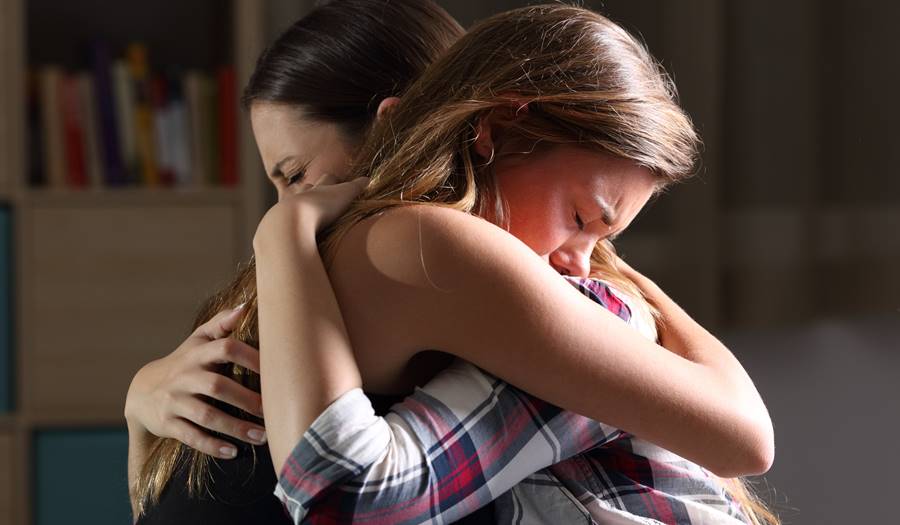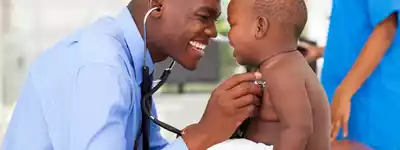
Children and Grief
1/24/2022
How to Explain Death and How Children Grieve
Death is part of the natural cycle of life. Children experience death throughout their life and as part of their everyday life from the death of neglected plants to beloved pets, family members and friends. COVID-19 has increased the number of children experiencing death with over 2 million children losing a parent or grandparent. How do you explain death to a toddler? How about a teen? How does a child experience grief?
Death and Grieving
How a child understands death and experiences grief is dependent on several factors including
- Age
- Development
- Personality
- How they react to stress or emotion
- Previous experience with death
- Family circumstances
- how others around them grieve,
- and the amount of support they receive.
Grief is a normal part of life and not something that is done correctly or incorrectly. It is not something to be fixed. Grief is unique for every person. Grief may include a range of emotions including sadness, anger, guilt, numbness, and relief. A person may experience one of these emotions, some of these emotions, or all these emotions at different points in their journey with grief. There is NO specific timeline for grief and grief may ebb and flow throughout someone’s life.
In general, children tend to grieve in bursts. They will have burst of grief followed by time where they seem unaffected. Younger children find understanding external causes of death, such as a car accident, while older children understand internal causes of death, such as cancer or a heart attack, more easily.
To fully understand death, a child must understand the four concepts of death:
- irreversibility (death cannot be changed)
- finality (it lasts forever)
- inevitability (everyone dies)
- and causality (what causes death)
If they don’t understand all four concepts, and this will depend on age and development, it will affect their ability to process and cope with death and grief.
In the following paragraphs, we will discuss how to speak about death and how grief affects different ages. For all ages, children benefit from learning of a loved one’s death from a trusted and loved adult or friend.
Children Under 3
Children under the age of 3 do not understand any of the four concepts of death and therefore have a hard time understanding death. Death should be explained using very simple terms and concrete language. Avoid euphemisms such as “sleeping” or “passed away”. The mechanism of death does not need to be included unless they ask.
Babies and toddlers may not actually experience grief due to their lack of understanding, instead they may react to your grief. They may be irritable and have changes to their sleep patterns. They may be more clingy than normal or have increased separation anxiety. They may also experience decreased interest in food. They may also experience regressions in developmental milestones. A verbal child may ask repeatedly where the person or pet is.
After experiencing a death, you can help a baby and toddler by keeping their routines as normal to before the loved one’s death as possible. This age group thrives on routine and will find comfort and safety in their normal routine. Make sure you take care of yourself and if you cannot care for your child due to your own grief or if you are unable to maintain their routine, try to use close friends and family to help you. Even if you cannot provide all of your child’s care, try to avoid being physically separated from your child. Your child may need physical comfort from you as well as comfort from special items such as a special blanket or lovey.
Children Aged 4-6
Children start to understand death at age 4 but not in its entirety. They do not understand the finality of death or the universality of death. They often see death as temporary. This belief is reinforced by cartoons and shows where characters suffer what should be fatal accidents, act dead, then spring back to life.
When explaining death to a child of this age, use simple language and factual information.
Let them know who died and that. their body stopped working and they can no longer sleep, eat, or play and you will not be able to see them again. Do let them know that that person or pet’s memory lives forever, and you can share memories and pictures together. Do not use euphemisms such as a person went to sleep, passed away, or has gone to the beyond. This type of language is not only confusing but can generate fears. They may believe if they go to sleep or you go to sleep they, or you, could die.
Often, we want to use our religion to help explain death. Using religion is appropriate if done correctly. Stay concrete and avoid saying things like “God wanted them with him” or “They wanted to be with God”. This language, like euphemisms, can also cause confusion and fear.
A child between 4-6 may experience changes due to grief. These might include changes to their eating and sleeping patterns. They may have changes in behavior including acting more withdrawn, having temper tantrums, and experiencing separation anxiety. They may have developmental regressions such as bedwetting in a previously trained child or may start thumb sucking or using “baby talk”.
You may also see them acting out death or their feelings through play or art. This is a healthy way for a child to process death and sharing their feelings. Because children this age do not understand the finality of death, they may repeatedly ask the same questions repeatedly. Consistently answer their questions. As aggravating or emotionally triggering as this can be, this is developmentally normal and part of the grief process at this age.
After a 4- to 6-year-old experiences death, keep their routine as predictable as possible. This will reduce fear, increase their feelings of safety, and will help provide them with stability. Keep sleep routines and mealtimes as routine as possible. If you are overwhelmed with your own grief, utilize familiar adults to help keep their routine and to provide any care needed. You can also provide support through talk and touch. Children of this age often have questions about death and feelings. You can explain your feelings to them and be open with your own grief. You can read books about death and remembering loved ones. You can help them create a memory box or include them in planning something for the person or for the funeral.
Sesame Street has a great video discussing death and grief that can be found HERE.
School Aged Children
This age group begins to understand the finality of death but not the inevitability or universality of death. Again, explaining death in concrete terms and avoiding euphemisms is the preferred way to discuss death. Let them ask questions and answer them to the best of your ability. Don’t be afraid to tell them you don’t know an answer to question but be willing to help them find the answer. Ask them what they understand and clear up any misunderstanding. Let them know that you are available for them to ask questions or share feelings at any time.
Children at this age can be very fearful of death. They personify death and make death into a “monster” or “boogey man”. They can worry death is coming to get them and may be overly concerned with their own safety, their own death or your death. Reassure them while everyone dies, most people live until old age.
School aged children may have recurrent thoughts about death or dying when grieving. They can feel guilty or worried that they are to blame or caused the death from thoughts they may have had about the person. They may also worry that everyone around them will die and they will be left alone. They may even be embarrassed they experienced death or embarrassed about the way they show grief.
School aged children may have more anxiety after experiencing the death of a loved one. They may require more physical affection and more of your time. They may experience changes in appetite or sleep. They may have behavior issues such as temper tantrums, may act defiant, or may get in trouble at school. They may have a hard time concentrating at school or may try to avoid going to school. They may socially withdraw, show no emotions, try to suppress their emotions, or have strong emotional reactions. They may also complain of somatic symptoms such as headaches or stomachaches.
This age group will also benefit from a consistent routine. Encourage physical activity and play as part of their daily routine. Physical separation should be kept to a minimum. This age may want to talk about death a lot. Take time to listen, talk and empathize with them. You can also include them in planning something to honor the person or pet or make a memory book, photo book, or scrap book about the person. Make sure books are readily available to read together or independently.

Teenagers
Teens understand all four concepts of death and are on the same level as adults in understanding death. Death should still be explained in concrete language, and you should clarify any misunderstandings and answer any questions they may have. Teenagers often want to find meaning in death. It may make them contemplate the “big picture” and the purpose of life.
Teens can experience a range of emotions after experiencing a death. However, teens can be resistant to sharing their emotions when grieving. They may try to suppress these emotions. They may experience grief in bursts but otherwise seem to not be affected. Some teens use sarcasm and humor to mask their feelings. Some teenagers may find they are overwhelmed with emotions including sadness. They may also experience guilt over being alive and anger at having no control over death. They may be worried that they are not safe. They may be embarrassed to have this experience or to be grieving. Some teenagers’ sadness is so deep and severe it will result in depression symptoms.
Teens experiencing grief may eat or sleep more or less than usual. Their sleep may include dreams of the person or pet who has died. They may experience physical symptoms such as chest pain, headache, or stomachaches. They may also experience regression of milestones including bedwetting.
Teens may change their behavior after experiencing death in similar ways to school age children. In addition, some teens may try to take on adult responsibilities and try to take care of others, especially if they have immediately family members who are overwhelmed with grief. They may try to be perfect and try hard to please everyone so as not to add to anyone’s burden.
Teens may withdraw from family and friends. They may isolate themselves or their relationships with peers and family may become strained. They may act out or increase risky behaviors. They may struggle to concentrate at school or avoid attending school. Their self-esteem may be decreased.
Allow your teenager to maintain their normal routine as much as possible. Let them know they can ask for support at any time and you will be there for them. Make sure your teen knows you do not expect them to take on an adult role or adult behaviors. Listen and try to understand their reactions. Do not force emotions or have expectations for “normal” emotions. Let them see how you are feeling and how you cope with grief in healthy ways. When a teen is grieving encourage them to express their grief in a health way. This can be through exercise, music, writing, drawing, art, other creative outlets, or talking. Acknowledge that they may feel differently from you and that is ok. A teen may be interested in finding ways to honor the person either at the funeral or afterwards.
Funerals
Whether or not a child attends a funeral needs to be based on your individual child and the situation. For some children, attending a funeral can be helpful and provide closure. For some children it can be traumatic.
If your child wants to go to the funeral, make sure you prepare them for what will happen. This may include whether the casket will be open, if there will be a memorial, and that they may see many people crying or very upset. If a child is very hesitant or not ready to attend a funeral, make sure they know you can work with them to find another way to say goodbye.
Suicide
When death is due to suicide, it can present an additional challenge in talking to children. Again, concrete language is best in this situation. You can explain that suicide is an illness in the brain that caused confusion and sadness.
A child that learns a loved one committed suicide can have varied emotions beyond sadness. They may experience fear because the world may no longer seem safe or predictable. Younger children may believe they can wish the person back or may worry the same thing may happen to them. They may be angry at the loved one. They may have a hard time grieving or feeling comfortable grieving if they notice the family feeling guilt, shame, or trying to hide the cause of death.
Death in the Immediate Family
Death of a friend, family member or pet is hard experience for any child. But what if a sibling or parent dies?
Sibling
The death of a sibling is traumatic and comes will immense sadness, but it also comes with other emotional effects and considerations. Often the surviving sibling or siblings can be the “forgotten mourners” with their grief neglected because the parents are the focus of the family’s grief. Siblings can experience survivor guilt especially with an unexpected death. If their relationship with their sibling was strained, there was an intense rivalry, or recent fights included harsh words, the surviving sibling may experience overwhelming guilt. A surviving sibling may also experience jealousy if the sibling that died is idealized by the parents. They may feel anger or resentment if they feel like a replacement child.
Older siblings may end up taking on a parental role if their parents are absorbed in their own grief. This can be maladaptive if it occurs for too long. Surviving siblings may also experience changes in how they are parented due to the death of a sibling. Parents may become overprotective. This can increase the risk of rebellious behaviors.
Children who experience the death of a sibling should attend therapy. Therapy is important to process the grief they feel from the loss of their sibling but may also help them have a safe place to express their feelings and grief outside of their family. They should also consider sibling support groups.
Parent
When a parent dies, a child experiences an unimaginable event with grief that will last throughout their life. These children often want to talk about their parent and their parent’s death. They feel closer to their parent when they can share that story. They may feel lonely and isolated from peers. They can also feel disconnected from their grieving parent.
A child whose parent died benefits from maintaining their normal activities. Physical closeness with family and friends is important. Be available to talk to your child. Make a memory box, preserve special items, and create rituals that help you remember the parent. Holidays and “firsts” such as the first birthday, Mother or Father’s Day, can be very hard times after the death of a parent (or sibling). Create new rituals or ways to honor and remember the loved one on that day.
Children who experience the death of a parent also should attend therapy and support groups. We want them to talk to friends and family, but they need a non-friend or family member in which to process their grief. These children need to be supported in their grieving. Children who experience the death of a parent are at higher risk, almost twice as likely, for mental health issues including depression, anxiety, and post-traumatic stress disorder. They are also more likely to attend less years of schooling, have less academic success, suffer from low self-esteem, and engage in riskier behaviors than peers who have not experienced the death of a parent. This is especially true if children are under the age of 12 when the death occurred. Therapy and processing of their grief can help reduce the risk of these situations.
Death and experiencing grief is a normal part of life and a lifelong process. If your child experienced a death and you feel their response is beyond the normal process of grief, affecting their ability to eat, sleep, attend school or activities, or is resulting in isolation, please do not hesitate to discuss with your providers.
Children’s Health Care of Newburyport, Massachusetts and Haverhill, Massachusetts is a pediatric healthcare practice providing care for families across the North Shore, Merrimack Valley, southern New Hampshire, and the Seacoast regions. The Children’s Health Care team includes pediatricians and pediatric nurse practitioners who provide comprehensive pediatric health care for children, including newborns, toddlers, school aged children, adolescents, and young adults. Our child-centered and family-focused approach covers preventative and urgent care, immunizations, and specialist referrals. Our services include an on on-site pediatric nutritionist, special needs care coordinator, and social workers. We also have walk in appointments available at all of our locations
for acute sick visits. Please visit chcmass.com where you will find information about our pediatric doctors, nurse practitioners, as well as our hours and services.
Disclaimer: this health information is for educational purposes only. You, the reader, assume full responsibility for how you choose to use it.
Resources
BOOKS: LINK HERE TO RECOMMENDED BOOKS BY AGE
LOCAL:
Care Dimensions, located in Danvers, MA, provides grief support via assessments, phone or in-person consultations, workshops, support groups, camps, community programs, and bereavement resources. They collaborate with schools, hospitals, and parent groups.
The Children's Room, located in Arlington, MA, provides grief services for children who have lost a parent or sibling and their families. They have peer support groups, parent groups, teen programs, and family night.
For more local programs click HERE.
Camp Erin is a free weekend bereavement camp for youth who are grieving a significant loss. For kids aged 6-17, the camp is focused on grief education, emotional support as well as traditional, fun camp activities.
Comfort Zone Camp is a camp for children aged 7-17 and young adults aged 18-25 who have lost a sibling, parent, guardian, or significant person. Camp provides grief support as well as a fun camp experience. Camp can be a 3-day traditional program, or a child can attend the Family Camp program with a parent or guardian.
Children’s Health Care of Newburyport, Massachusetts and Haverhill, Massachusetts is a pediatric healthcare practice providing care for families across the North Shore, Merrimack Valley, southern New Hampshire, and the Seacoast regions. The Children’s Health Care team includes pediatricians and pediatric nurse practitioners who provide comprehensive pediatric health care for children, including newborns, toddlers, school aged children, adolescents, and young adults. Our child-centered and family-focused approach covers preventative and urgent care, immunizations, and specialist referrals. Our services include an on-site pediatric nutritionist, special needs care coordinator, and social workers. We also have walk-in appointments available at all of our locations for acute sick visits. Please visit chcmass.com where you will find information about our pediatric doctors, nurse practitioners, as well as our hours and services.
Disclaimer: this health information is for educational purposes only. You, the reader, assume full responsibility for how you choose to use it.








